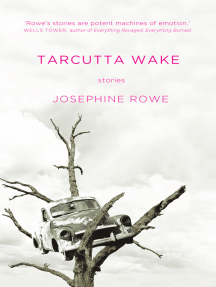
- Free Article: No
- Contents Category: Fiction
- Review Article: Yes
- Online Only: No
- Custom Highlight Text:
The Rest is Weight, by Jennifer Mills, is a restless collection of short stories. Its settings include Russia, remote parts of Australia, Mexico, and China. The stories are densely packed; there are no ‘snapshots’ or ‘sketches’, only well-made narratives populated by plausible, complicated characters. Nor is there any decorative writing; no showy turns of phrase, only tough, efficient prose, always working in service of a narrative. Style is subordinate to substance for Mills, and the result is a book that will draw in new readers, as well as pleasing those who have already enjoyed her previous two novels.
- Book 1 Title: The Rest is Weight
- Book 1 Biblio: University of Queensland Press, $19.95 pb, 241 pp, 9780702249402
- Book 2 Title: Tarcutta Wake
- Book 2 Biblio: University of Queensland Press, $19.95 pb, 104 pp, 9780702249303
- Book 2 Cover Small (400 x 600):

- Book 2 Cover (800 x 1200):

- Book 2 Cover Path (no longer required): images/1_SocialMedia/2021/Dec_2021/META/1617220186.png
Mills’s writing has a strong corporeal element. In ‘The Lap’, the first thing we learn from Lucy is that ‘the campervan smells like other people’, and that, ‘no matter what she uses, she can’t completely disguise the traces of previous inhabitants’. The characters, often first-person narrators, tend to be loners, people on the edge, or at risk. Although exactly what sort of risk is not always clear, as is the case in ‘The Capital of Missing Persons’, a slow-burning story about a family reunion, which maintains a vital sense of tension throughout. Other stories, such as ‘Unconditional Love’, in which a woman steals a baby, simply stare down the reader from the first line: ‘I stash the baby in a corner of the lot.’ Most of the action takes place inside the heads of Mills’s protagonists, but certain stories show off her ear for twangy Australian chatter and gags. When, in ‘Crow Season’, a driver with ‘holes where teeth should be’ picks up a hitchhiker on the run, a dark, absurd joke unfolds: ‘Armed robbery, I say. Three years for aggravated. She raises an eyebrow. What with? Kebab skewer.’ Mills’s greatest gift, however, is the ability to turn a story on its head, calling into being all sorts of macabre possibilities. In ‘The Jungle Will Swallow Anything’, a young girl, Mia, lives with her hard-working and devoted shopkeeper mother. When Mia ‘hears about the vampires from a boy at school’, there is a suggestion of hallucination; then she sees ‘the tall man bent over her mother like a stick insect’ and ‘the needle he holds to her mother’s arm’. This is a country that doesn’t require a passport stamp: nightmare territory.
The opening story of Josephine Rowe’s collection Tarcutta Wake starts mid-sentence:
And she had this way of swivelling her head round, like an owl to talk to you as she drove, except not like an owl because the skin of her neck creased up in folds and she looked old when that happened, though she wasn’t, not then, and Luke would lean over and say, Watch the road, Mum.
Brevity is vital; there are no throat-clearing remarks to introduce the stories. Equally important are the rhythms of speech; the fractal structure of this first sentence, in which a narrator’s chronologically confused thoughts are allowed to bleed into each other and mix with the speech of a secondary character, is a prototype for the kind of syntactical constructions to come. Indeed this first sentence establishes a truth that holds throughout the book: Rowe has total stylistic control.
This rigour is perhaps why many of the stories in Tarcutta Wake seem so alike. Almost always a mood of melancholy reigns, and each story takes a similar shape. Often a short burst of information is embedded in the early sentences, enough to encourage one to read on. Take the first sentence of ‘Into the Arms of the Parade’: ‘I went into her apartment and there was nothing on the walls.’ Or that of ‘Adeline’: ‘In the middle of December the roof caved in.’ Something sad has always happened to one of Rowe’s characters – what exactly we are not sure, but we know the hallmarks of desolation when we see them. The settings are edgy, but each has a kind of gritty glamour. Maybe someone has died (‘Raising the Wreck’ and ‘Tarcutta Wake’) or everyone has grown up and moved out of that great share house (‘In the Morning We Would Sometimes Hear Him Singing’). A sense of loss and foreboding is established, and the story proceeds in a more neutral tone. ‘I imagined he still looked a little homeless,’ the narrator tells us in ‘Vending Machine at the End of the World’. Who? Why? We always know less than we want to. But something confessional is happening. Then, suddenly, after just enough information to be able to guess at a narrative (these stories are almost all very short), comes an oblique dénouement. From ‘The Tank’: ‘When they finally let him out of the tank he stood naked on shaky legs and knew all of it for what it was.’ It is hard to say what it all means, but there is the terrible suspicion that nothing will change. Cue a bruising final touch (this one from ‘Brisbane’): ‘I know she’s lying, cause she’s got her lips pressed into a pale line and her eyes fixed hard on the road.’
Generalising like this does disservice to certain stories, but Tarcutta Wake’s greatest strength (a monochromatic yet impeccable style) and its greatest weakness (a tendency to a formulaic tone and structure) are two sides of the same coin. Still, the stories are mysterious and satisfying. One of them, ‘Raising the Wreck’, is brilliant.


Comments powered by CComment